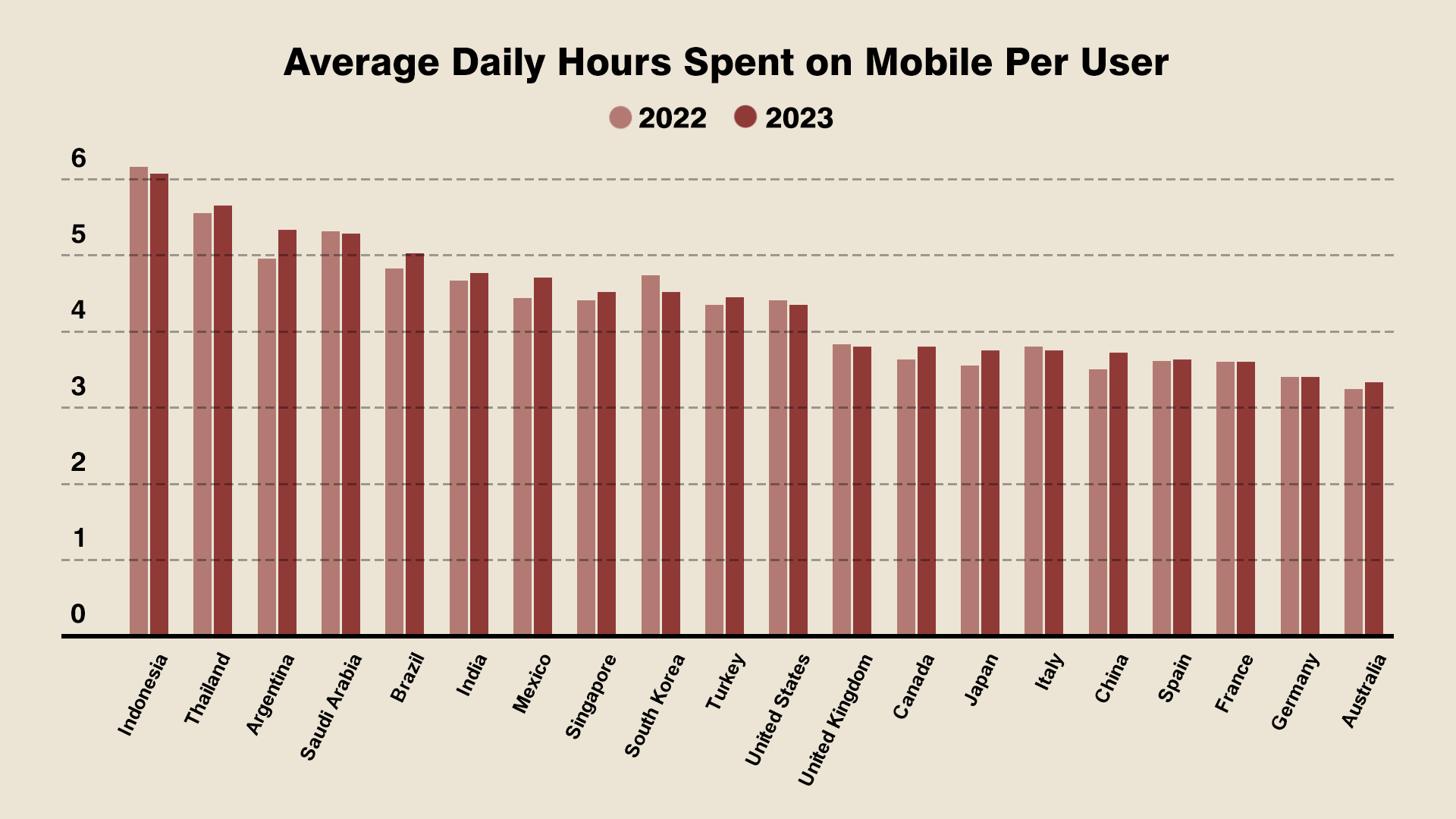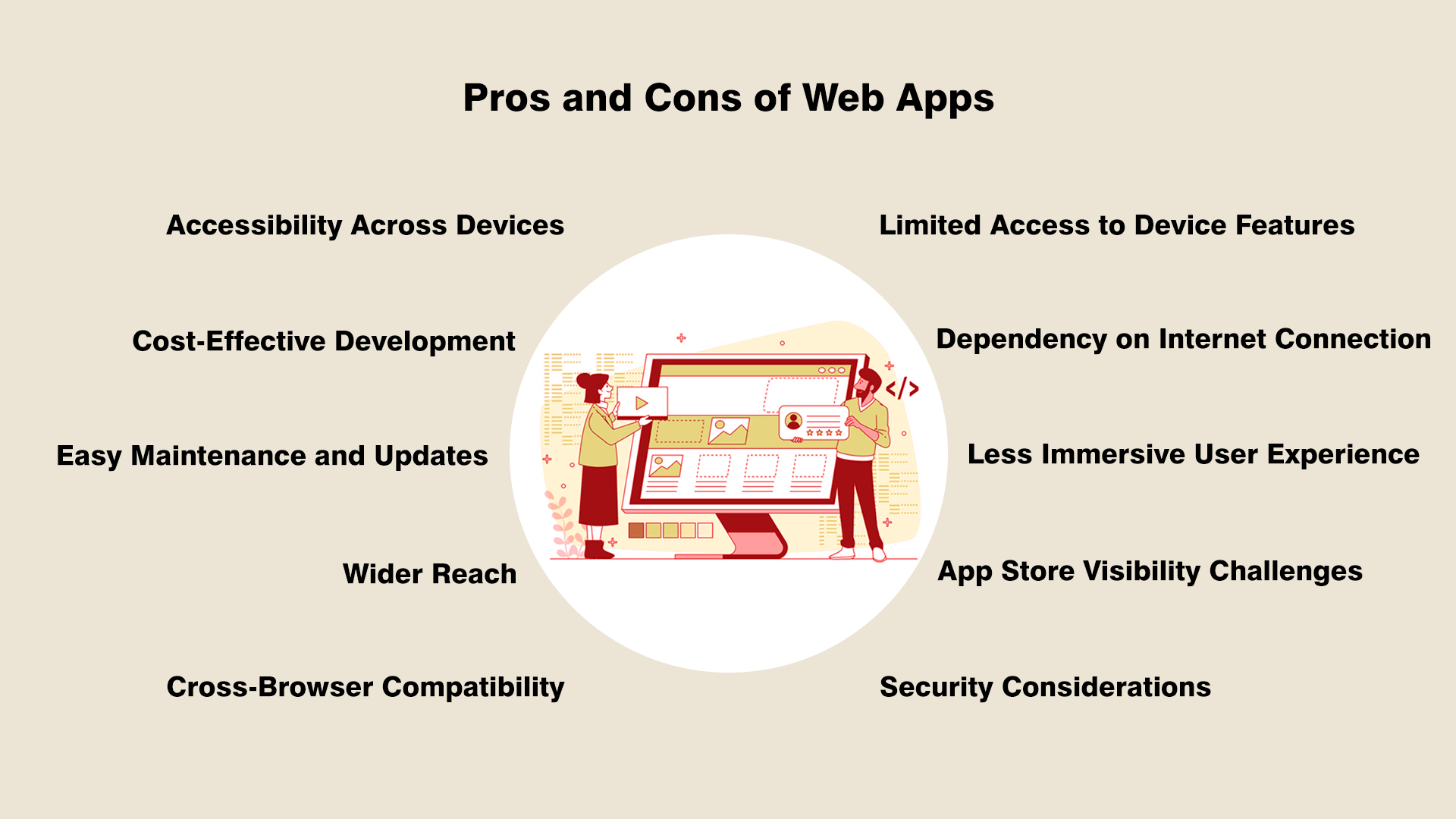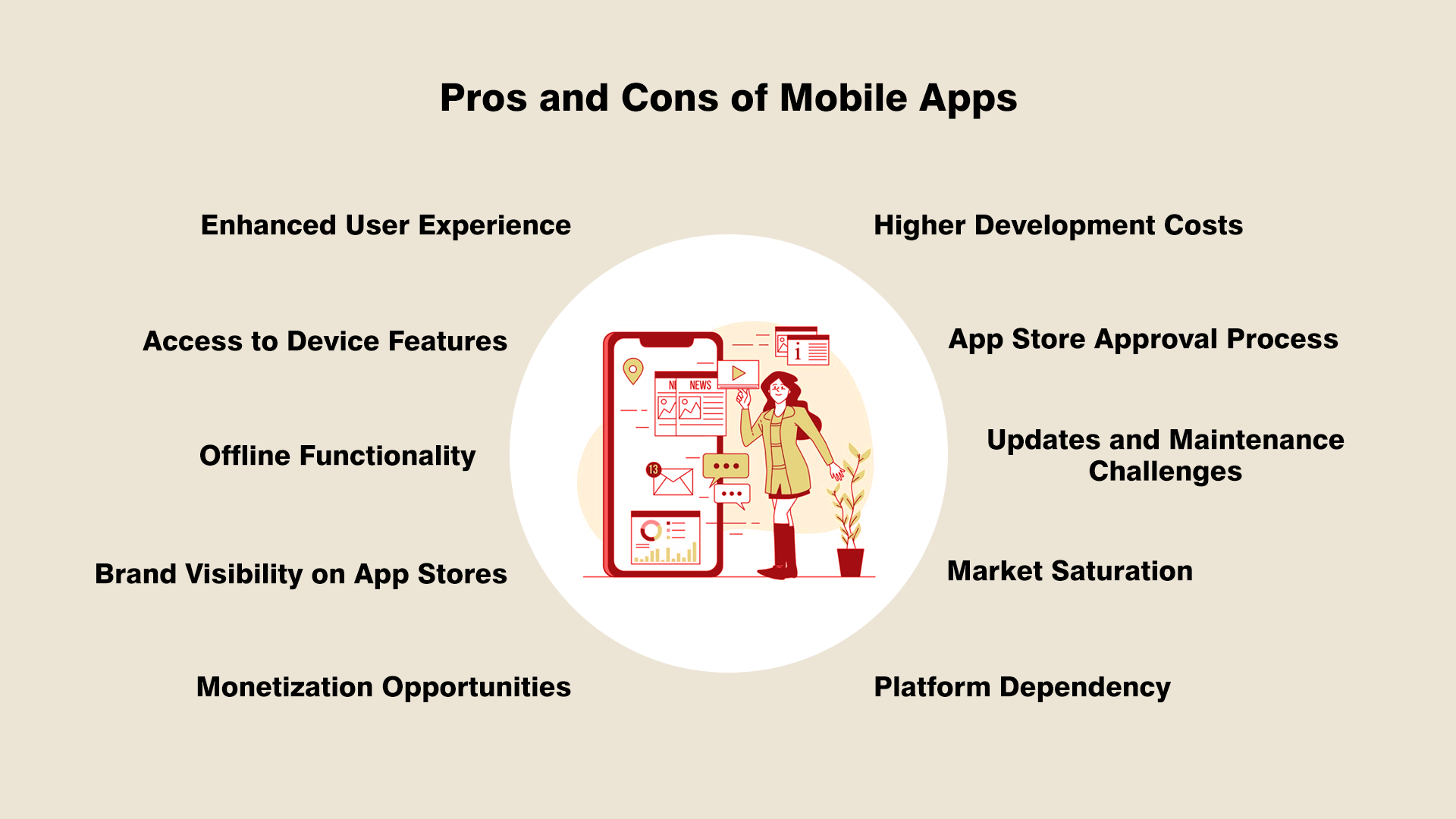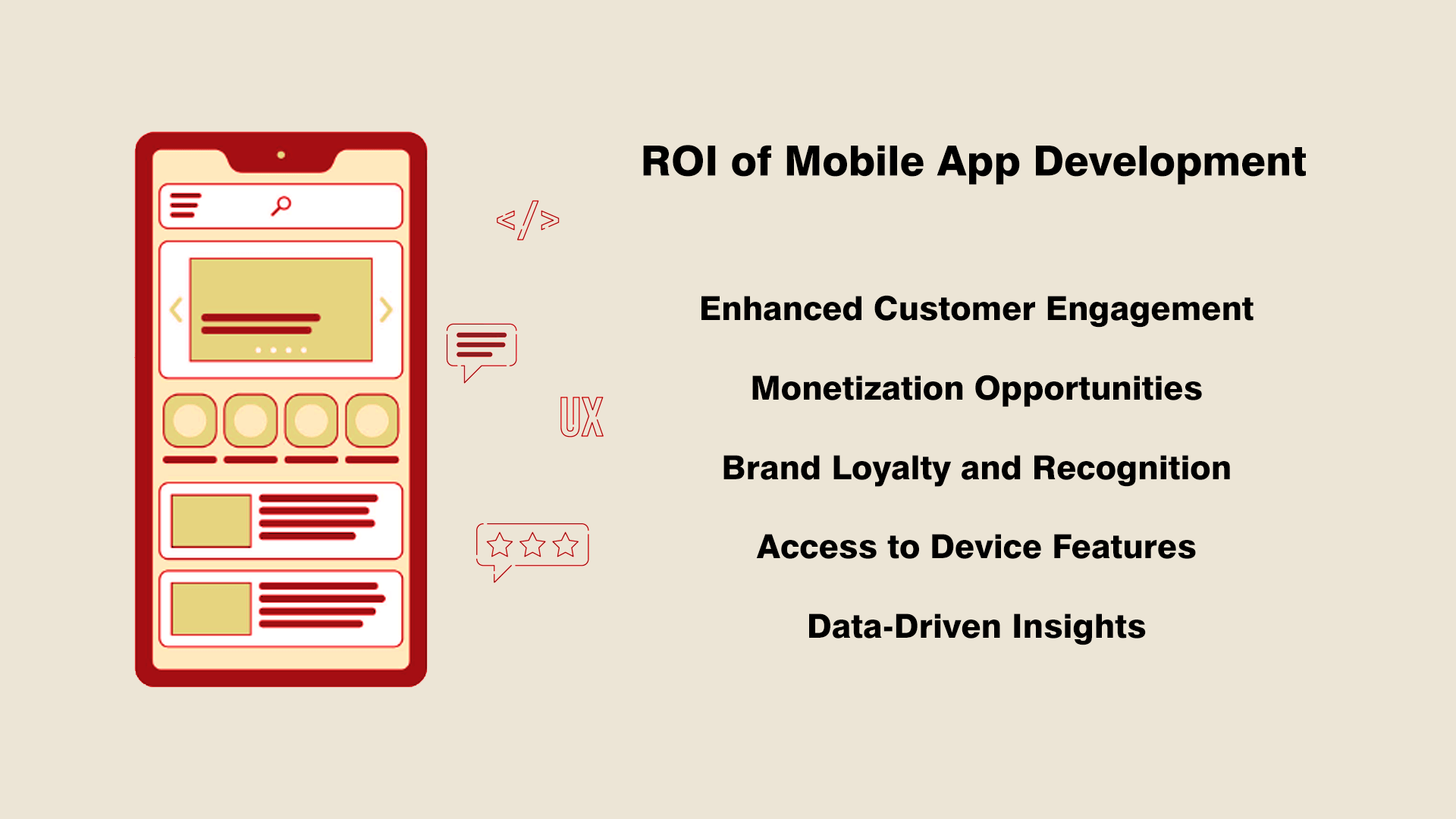Mobile App vs. Web App: Which Is Right for Your Business

In the rapidly evolving landscape of digital technology, businesses face a crucial decision when considering their online presence: whether they should invest in a mobile app, a web app or both? This is not an issue of technology choice alone; this question embodies a business’s reach, user engagement, and its success overall.
Picking the right platform is not only a technical decision, it’s one with business implications for competitiveness and customer satisfaction. The design of the digital interface that a company produces is highly critical in establishing user experiences, molding brand perceptions and defining success for its digital efforts.
Well designed mobile apps can take advantage of characteristics uniquely available on the smartphone and provide users with a personalized and engaging experience. Knowing the intricacies of mobile apps and web apps is crucial for any business looking to make informed decisions.
One of the top takeaways from the 2024 State of Mobile report is that although competition among various modalities for capturing consumers’ attention through apps increases, it does not alter devotion or practical time spent on these applications daily. It was more than five hours in 2019 for all cross-market measurements in time spent in apps that would be top 10 mobile first markets with #1 Indonesian being over six and a half. Collectively, these short-term gains added roughly 6 percent more than average daily levels of time spent. But what is driving this growth? In 2024, a part of it even evaporated partly because one category rose and another slumped.

Join us as we explore mobile app development and web app deployment, considering technical requirements alongside the potential benefits of each option to your business. Let’s take a look at the pros and cons to determine which path is right for your business.
Understanding Your Business Needs: Navigating the Mobile App vs. Web App Decision

With increased business entry into the digital world, choosing whether to develop a mobile app and web app or even both is an important strategic choice against key factors. In order to choose correctly, it is crucial to analyze the specific features of your business, know who you are serving and clearly set goals.
Nature of Your Business
Think about your business and goods or services that you provide. If your offerings require a constant and real-time presence of users, then mobile app development would be the best option. For instance, an e-commerce platform leverages the immersive nature of a mobile app that presents users with seamless options to browse, shop and receive personalized recommendations.
Alternatively, if your business revolves around content consumption, informational resources, or services that do not require constant time on mobile phones then a web app may prove to be more suitable. A web app is a good option for most corporate websites, news portals, and project management tools.
Understanding Your Target Audience
The target audience is crucial in defining the platform that best caters to their tastes and conduct. If the majority of your audience uses mobile devices for accessing services or products, a mobile app guarantees a more personalized and user-friendly interface. Consider the demographics, device preferences, and behavior of your online users to ensure that your digital strategy is adapted to those habits.
Determining your target audience’s device and platform preferences by conducting market research and analyzing user data is crucial. It is possible to make informed decisions based on an understanding of their expectations and the ways in which they engage with digital products, taking into consideration what appeals to the end-users.
Defining Your Goals
Your business objectives should also affect the choice of platform. If you want to focus on boosting user interaction, leveraging mobile-specific functionality, or offering content access while the gadget is offline, a solution in the form of an app may be your choice. On the contrary, if your target is wider availability, easy updating and a lower cost of building it, then a web application could better serve your goals.
Take into account both short-term and long-term objectives. Do you want to create a long-term user base or is this about establishing your online presence quickly? By evaluating your goals, you are in a position to determine which features and functionalities are most necessary for the success of your digital venture.
First, an understanding of these basic aspects provides a framework toward deciding whether a mobile app or web app is ideal for your business. In the subsequent parts below, we shall focus on an in-depth analysis of advantages and disadvantages for every platform giving a thorough guide to assist you in navigating this ever-changing world of mobile and web app development.
Pros and Cons of Web Apps: Navigating the Digital Landscape

Applications accessed through web browsers have become important parts of the digital environment. Their flexibility and accessibility make them an attractive option for companies looking to have wide representation online. This chapter will discuss the pros and cons of creating web apps, highlighting issues like accessibility, cost-effectiveness, and sustainability.
Advantages of Web Apps
- Accessibility Across Devices
Web apps are independent of platforms and can be reached through different devices with an internet connection. Users can easily interact with the application even if they are operating from a desktop, laptop, tablet or smart phone by opening the standard web browser.
- Cost-Effective Development
Developing a web app takes less time and money than mobile apps. Development with one codebase that runs on multiple devices makes everything easier, especially for business organizations with limited funds.
- Easy Maintenance and Updates
Updating a web app implies changes made on the server which would reflect across all devices at once. Maintenance is made easier with this centralized control, meaning that users always have the latest features and improvements available to them without any manual updates.
- Wider Reach
Since web apps don’t need an app store to be distributed, they can reach more people. Users can find and access the application directly through search engines, social media platforms or direct links that will help increase visibility and availability.
- Cross-Browser Compatibility
Web apps are meant to run on various browsers, allowing users to enjoy the same experience whether they use Internet Explorer or Firefox. This does away with compatibility problems that may arise from certain mobile devices.
Disadvantages of Web Apps
- Limited Access to Device Features
Web apps also have some restrictions in terms of access to some device features like sensors, cameras and offline capability. This can be a weakness for applications that make intensive use of device-specific capabilities.
- Dependency on Internet Connection
Web apps need the internet to function fully. Offline access is weakened, users who have a bad connection or prefer not to use connector applications are affected.
- Less Immersive User Experience
Though web technology innovations have increased the user experience, native mobile applications still sometimes provide a more involved and reactant sensation. This distinction can be best seen in graphics-intensive or highly interactive applications.
- App Store Visibility Challenges
Web apps are less visible than mobile applications featured in app stores. Finding your content may be a barrier that might force businesses to spend money on good marketing and SEO tactics.
- Security Considerations
Web apps are also prone to some security threats, like cross-site scripting (XSS) and cross-site request forgery (CSRF). Strict security precautions need to be put in place to protect user data.
In evaluating the advantages and disadvantages of web apps, companies can understand what is right for their business. In the next section, various pros and cons of mobile app development will be discussed, giving a detailed comparison with which businesses can choose their digital strategy.
Pros and Cons of Mobile Apps: Crafting a Tailored Digital Experience

In the current digital environment, mobile applications have become more and widely used to interact with users on the go. In this regard, there is a need to examine the benefits and costs of mobile application development. In this section, we will analyze the main components including user experience, device specification and market penetration.
Advantages of Mobile Apps
- Enhanced User Experience
Mobile apps are more engaging and user-friendly than web apps. The interface is designed to cater for smaller screens, touch inputs and gestures on screen that are easy to use.
- Access to Device Features
Mobile apps can use device-specific features including GPS, camera, accelerometer and push notification. This makes it possible to develop features that are tightly bound to the capabilities of the user’s device.
- Offline Functionality
As opposed to web apps, mobile apps can provide some features even when offline. That is especially beneficial for users who live in places with unstable internet connections or those who want to read something without using the web.
- Brand Visibility on App Stores
Appearance on popular app stores, for instance Apple App Store, Google Play boosts the visibility and searchability of mobile apps. Brand recognition takes place because users browse app stores to find new and popular apps.
- Monetization Opportunities
The mobile apps, on the other hand, provide a channel for monetization through various models including in-app purchases, subscriptions and advertisements. The app generates revenues directly for businesses that contribute to the overall financial performance.
Disadvantages of Mobile Apps
- Higher Development Costs
The cost of developing mobile apps for various platforms (such as the iOS and Android systems) is higher than that of web apps. A separate code base is needed for each platform, thereby increasing the time and costs involved.
- App Store Approval Process
Mobile applications are submitted to app stores for review and approval. Any delays in approval can affect the planned release timeline for the app and rejection because of failure to comply with set guidelines is a risk developers have to handle.
- Updates and Maintenance Challenges
It is important for regular updates to correct bugs, to add new functions and secure compatibility with the newest devices. It is not easy to coordinate updates across a variety of platforms or to manage user expectations.
- Market Saturation
App stores are flooded with many applications. Earning visibility and a competitive advantage necessitate sound marketing strategies. Even the best apps will fail to take off without adequate promotion.
- Platform Dependency
Mobile apps are specific to the platforms, necessitating different development work for IOS and Android. This poses challenges to businesses that intend to meet a wide range of users since they have to invest in both platforms or prioritize one platform over the other.
In evaluating the merits and demerits of mobile app development, companies can formulate tactical decisions that take note of their needs, target audience as well as considerations based on finances. The following section will synthesize these findings helping businesses to decide if a web app or mobile app goes more in line with their specific needs.
Choosing Between Web Apps and Mobile Apps: A Strategic Decision
Now armed with a comprehensive understanding of the pros and cons associated with web apps and mobile apps, the pivotal question arises: Should you create a web-app or mobile app for your business? The response lies in a complicated analysis of your unique requirements, audience, and overall direction.
Summarizing the Insights
- For Web Apps
Web apps, which run on web browsers are cheaper and highly flexible. They are superior in situations where great accessibility, easy maintenance and uniform operation across devices is a need. So, web apps can be a better option for companies with limited budgets, those who deal specifically with content or want to get widespread online visibility.
- For Mobile Apps
In contrast, mobile apps focus on user experience and device-specific functions. It performs brilliantly when a business tries to offer an immersive, interactive and offline-enabled experience to the users. If your audience is mostly using mobile devices and the business model implies monetization strategies or depends on particular smartphone features, a mobile app may be a strategic choice.
Guidance on Decision-Making
- Consider Your Audience Habits - If most of your target customers use mobile devices, such an app might better suit their habits and preferences. Analyze user data and behavior to figure out where your audience is most likely to interact with the application.
- Assess Budget and Development Constraints - Taking both the budget and resources available for development into consideration. Mobile apps may actually turn out to be more costly as a result of platform-specific development, whereas web apps typically offer an affordable solution with a unified code base.
- Evaluate the Nature of Your Business - The nature of your business and what type of products or services you provide are very important. Content-oriented companies, informational resources, and those who need widespread accessibility may incline to web applications. Firms focusing on user engagement, personalized experiences, and deploying device features may consider mobile apps more appropriate.
- Understand the Offline Needs - If offline functionality is a must for your business model, mobile apps have that distinct advantage. Ask yourself whether users of your application will need to use it in environments with limited or no internet connections.
- Monetization Strategies - If you base your business model on in-app purchases, subscriptions or advertising, mobile apps offer direct monetization opportunities. Evaluate whether the selected platform matches your company’s financial goals.
- Balancing Visibility and User Experience - Assess the trade-off between app store visibility and user experience. Mobile apps receive the exposure through the app store but web applications can be found online. Take into account the marketing strategy and the competitive market in your industry.
Web-app or mobile apps, however amazing they might seem in this highly competitive digital landscape is not a binary one. It involves an overall investigation of your needs as a company and the user’s requirements, in addition to considerations around competition. Thanks to the knowledge gained in this mission, now you can choose wisely according to which path your company must journey towards digital victory.
Is It Worth It to Build a Mobile App for Your Business? Unveiling the ROI of Mobile App Development
Is Building a Mobile App for your Business Necessary? Surfacing the ROI of Mobile Application Development.
This is a vital investment choice for many corporations, given that the assessed value of the setting in question largely depends on prospects' gains. Although mobile apps development involves high costs and lots of complexity, its key value rests in the competitive gains it engenders. Let’s look into the elements that influence ROI of mobile app development and consider circumstances when a mobile application can greatly help business.
Exploring the Return on Investment (ROI)

- Enhanced Customer Engagement - An efficient and rich mobile application can help secure better customer engagement. By making it easier for users to interact with your products or services, you open up the possibilities of repeat business, brand loyalty, and positive word-of-mouth marketing.
- Monetization Opportunities - Mobile apps provide various revenue opportunities, which include in-app purchases, subscriptions and ads. These sources of income can become very valuable for your business as a whole and thus make mobile app development an important investment in the long-term success of the company.
- Brand Loyalty and Recognition - A specialized mobile app can encourage customer brand fidelity by providing users with a consistent, customized experience. The fact that your app is on users’ devices reminds them about their brand and increases the chances of returning to purchase certain products or services.
- Access to Device Features - Using features specific to the device such as GPS, camera and push notifications can help businesses create original and unique functionalities. Not only does this improve the user experience, it also allows opportunities to differentiate itself in a crowded market with users that can be attracted and kept.
- Data-Driven Insights - Mobile apps provide invaluable information about users, such as user’s behavior, likes and tendencies. This data analysis enables organizations to make sound judgments, perfect marketing techniques, and further advance the app in accordance with dynamic user demands.
Scenarios Where Mobile Apps Provide Significant Benefits
- E-Commerce and Retail
A mobile app, therefore, offers a smooth shopping experience, personalized recommendations as well as convenience of on the go purchasing to businesses in e-commerce and retail. Such functions as mobile payments and order tracking not only improve users’ satisfaction but result in higher sales figures and customer loyalty as well.
- Healthcare and Fitness
Healthcare and fitness mobile apps may provide tailored wellness plans, activity logging, or remote monitoring. These apps not only support user health but also open up the possibility of a subscription-based model or partnering with healthcare organizations.
- Travel and Hospitality
When it comes to the travel business, mobile apps can simplify reservations, provide real-time notifications, and even issue personalized guidance. These apps improve customer experience, resulting in more bookings and positive reviews.
- Food and Beverage
Restaurant mobile apps and food delivery applications increase customer comfortability by allowing online food orders, reservations, and loyalty programs. The simplicity and convenience further lead to increased customer satisfaction, as well as loyalty.
- Education and Learning
In terms of the education industry, mobile apps can offer interactive educational materials, quizzes, and tracking progress. These apps respond to the increasing demand for flexible and convenient learning, thus proving their usefulness both schools and online learning sites.
Finally, creating a mobile app for your business is an investment point to consider with the potential returns on investments. Many companies have seen huge benefits including better customer engagement, as well as new revenue streams. By integrating mobile app development with your strategic objectives and intended beneficiary, you are able to tap into the immense potential of this tool for digital transformation and leave a lasting footprint on your organization’s winning trajectory.
Introducing Addevice: Crafting Tailored Mobile Solutions for Your Digital Success

In the ever-changing world of digital innovation, Addevice is a top custom mobile software developer that converts visionary ideas into innovative mobile applications. Addevice is driven by a culture of excellence, specializing in personalized mobile application development for businesses in all verticals.
Expertise in Custom Mobile Software Development
At the heart of Addevice’s services is an expert group of creative professionals with a passion for innovation. In the field of custom mobile software development, Addevice is known for transforming business concepts into fully functioning and user-friendly applications. The constant desire to remain updated on the newest technologies guarantees clients receive relevant and future-proof solutions.
Key Services and Competencies
- Software Testing Services
By undertaking stringent testing procedures, Addevice guarantees the quality and efficiency of software solutions. The company’s services offer functionality and usability testing, security, and performance testing that ensures an ideal user experience.
- CTO as a Service
For businesses requiring a strategic technological leadership, Addevice offers CTO as a Service. This solution provides mature guidance to formulate technology strategies, link them with business ambitions and propel digital transformation.
- MVP Development
Addevice is focused on creating impoverished versions of the product to allow entrepreneurs to test their concepts in the market. This repetitive process of validating ideas, receiving user feedback and improving the product for market fit is adopted here.
- Discovery Phase
Realizing the significance of comprehensive project planning, Addevice provides a Discovery Phase service. This first step encompasses in-depth analysis, requirement collection and strategic planning to lay the ground for effective project implementation.
- Legacy Software Services
Addevice helps businesses to modernize and enhance their legacy software solutions. With conservative analysis and deliberate changes to the existing systems, the company makes sure that legacy systems transform into contemporary industry standards and business requirements.
- DevOps Services
The Addevice DevOps culture ensures more efficient development processes, enhanced cooperation between developers and operations teams, and quicker release of software products to market.
- Web App Development
Web app development is a field in which Addevice has a lot of experience, which ensures that businesses have an outstanding online presence. The company provides such solutions as interactive websites, web applications and others which correspond with clients’ brand goals or business objectives.
- Support Services
After launch, Addevice delivers maintenance services to deal with any arising issues, update software solutions and keep them performing at the highest level.
- Mobile App Design Services
Understanding the importance of design in user experience, Addevice provides mobile app design services aimed at developing visually appealing, useful and easy-to-use interfaces.
- Mobile App Development
Addevice is known for its ability to develop bespoke mobile apps that address the specific requirements and objectives of companies. The company specializes in the development of iOS and Android apps, as well as cross-platform solutions that provide mesmerizing user experiences.
- Flutter App Development
The company uses Flutter technology to create cross-platform mobile applications that feel native for both platforms, Android and iOS.
- Team Extension
Addevice supports development teams with team extension services, where businesses can grow their capacity without the challenges of hiring and employing.
- Business Analysis
One of the key areas in which Addevice offers business analysis services is by assisting businesses to define project requirements that will enhance identification of improvement opportunities and ensure technological solutions are consistent with wider business goals.
Propel Your Vision with Addevice, Your Trusted App Development Partner

When it comes to digital innovation, the decision of choosing the right app developer partner matters a lot in making your dream come true. Addevice, with its focus on quality and a wide range of services, is your ideal partner in transformative app development.
For the journey we’ve taken through mobile and web app options, strategic planning, and all the broad services that Addevice has to offer it is evident this is not just a company - but rather a vehicle for digital victory. From conceptualizing the latest mobile app to redeveloping your website and providing effective technology management, Addevice will help you fulfill your dreams.
Why Choose Addevice
- Expertise: Enjoy the services of seasoned professionals great in custom mobile software development, who will create a functional application that is ahead of the rest regarding user experience.
- Comprehensive Services: Delve into a multidimensional array of services, including the discovery phases and MVP creation to ongoing maintenance and legacy software optimization – tailored specifically for your business.
- Innovation at Its Core: Addevice is more than an app developer; it’s a center for innovation. Taking a progressive approach, the company uses state-of-the-art technologies and practices to futureproof your solutions.
- Strategic Guidance: When looking for strategic technology leadership, Addevice’s CTO as a Service provides expert counsel to help you align your technology strategies with the objectives of your business.
Take the Next Step with Addevice
Start a digital transformation journey and outsource app development to Addevice. If you have seen what is possible and are ready to achieve your dreams, we welcome you to the next stage.
Contact Addevice today to talk about your ideas, goals, and vision for applications development. Allow our experts to accompany you on the journey, from the consultation phase to delivering innovative solutions that will bring your business to a new level.
Your digital success story starts off with Addevice - where innovation meets superiority. Reach out to us today, and let’s make something great together.
Choosing Between Mobile App and Web App?
Explore the key differences and benefits to make the right decision for your project.
📱 Seamless Mobile Experience
🌐 Universal Web Accessibility
💡 Tailored Solutions for Your Needs
Table of contents
FAQ
Not necessarily. Your decision to build either a mobile or web app should be informed by the nature of your business goals, target audience, and types of offerings. While some firms find success with only a mobile app, others are successful with just a web app. The decision will be based on a thorough analysis of your particular requirements.
The development price is determined by a number of factors such as level of features’ complexity, platforms to be targeted and design demands. As a general rule, mobile apps often require higher development costs because they need different versions for iOS and Android. Still, the long-term benefits and profitability are greater than the starting cost.
Perform comprehensive market research and study user behavior data. If your audience primarily opts for mobile devices to access online content, a mobile app might be better suited in accordance with their choices. Knowing their habits, demographics and device preferences will help to determine the preferred platform.
Take into account the following variables: type of business, target audience, objectives and budget. Determine the demand for offline use, device-specific options and user involvement level. A strategic decision, however, involves finding the right balance between these factors to select a platform that best matches your business goals.
Yes it is possible but may include factors like data migration, users migration and feature changes. The platform switch should be guided by the dynamic business requirements and user needs. Proper planning and communication are needed to make sure a smooth change for the business as well as its users.
 How Much Does It Cost to Build a Messaging App?
How Much Does It Cost to Build a Messaging App?
 How to Create an NFT Marketplace: Development Guide
How to Create an NFT Marketplace: Development Guide
 Must-Have Uber App Features: Building a Ridesharing App
Must-Have Uber App Features: Building a Ridesharing App